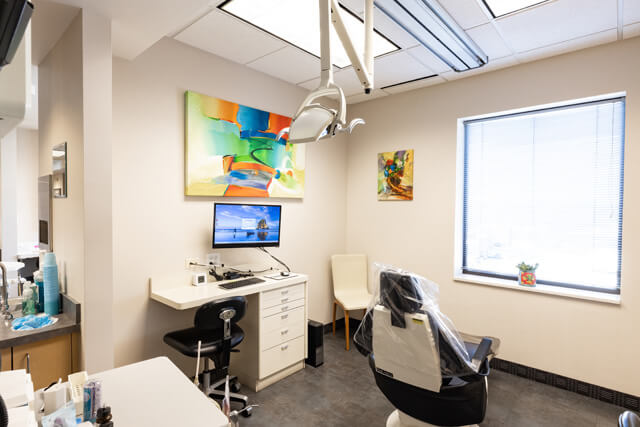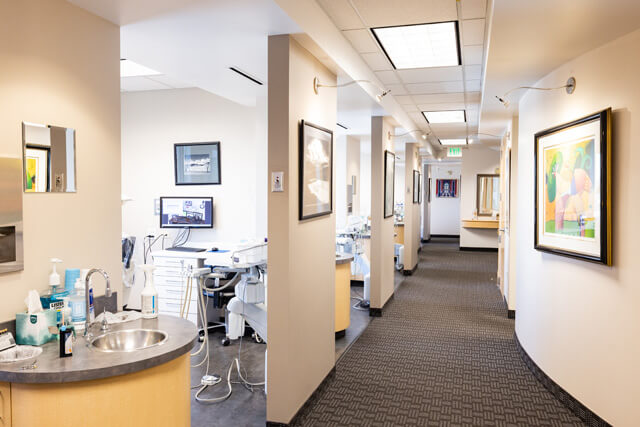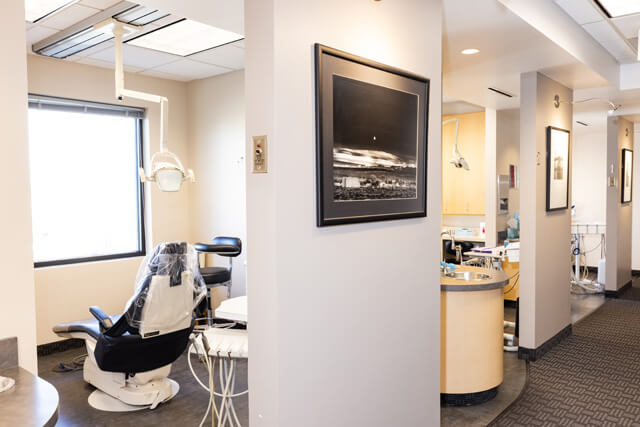Denver Root Canal Specialists
Root canal therapy is a treatment used to save a tooth that is infected or that has been damaged. The procedure involves removing the damaged or infected tissue from inside the tooth and cleaning and sealing the root canal.
Root canal therapy can be used to treat a number of different conditions, including
- Extensive decay
- Infection
- Damage to the tooth
- Inflammation
Root canal therapy is a safe and effective way to save a damaged or infected tooth. The procedure is usually completed in one or two visits to the dentist, and most people experience little to no discomfort during or after the procedure.
Root canals are a common procedure performed by dentists and endodontists, and they have a very high success rate. More than 15 million root canals are performed annually in the United States.
Root canal therapy is a routine general dentistry service at our Cherry Creek practice. If you’re looking for the best Denver root canal dentist or Englewood root canal specialist, schedule an appointment with us at DeWitt Dental Associates at (303) 321-5656 or complete the online booking form.

What is a Root Canal?
The root canal is the area within the root of a tooth. It’s made up of the dental pulp chamber (which contains blood vessels, nerves, and connective tissue) and the root canal (a narrow passageway that runs from the pulp chamber down to the tip of the root).
Endodontic treatment, known as root canal therapy, is performed when the pulp becomes inflamed or infected. The affected nerve tissue is removed, and the root canal is cleaned and sealed to prevent further problems such as infections and bone loss.
How Do I Know If I Need a Root Canal?
If you have a toothache, you should see a dentist as soon as possible. Only a trained dentist can determine whether you need a root canal or another dental treatment.
Signs you may need endodontic therapy:
- Severe tooth pain when chewing or when pressure is applied to a tooth
- Prolonged sensitivity or pain to hot or cold temperatures (after the hot or cold sensation has dissipated)
- Discoloration (a darkening) of the diseased tooth
- Swelling and tenderness in nearby gums
- Persistent or recurring pimple on the gum
What Happens During Root Canal Therapy?

The first step is to take dental X-rays of the tooth to determine the shape of the root canals and check for any signs of infection due to deep decay. To start the procedure, the dentist will numb the area around the tooth with local anesthesia. (If you need oral or IV sedation, your dentist will discuss this with you during your consultation.)
Once the tooth is numb, the dentist will place a rubber dam (a small latex sheet) around the tooth to keep it dry and free of saliva during the procedure.
The dentist will then make an opening or access hole in the infected tooth to access the infected pulp chamber. The pulp chamber and tooth canal(s) will be cleaned of necrotic soft tissue and disinfected with tiny instruments and irrigation solutions. Once the root canal(s) are clean, they will be filled with a rubber-like sealing material called gutta-percha to protect the tooth from infection. In some cases, 2-3 visits may be needed due to large infections or curved canals.
The opening in the tooth will be sealed with a temporary or permanent filling. A permanent crown or other dental restoration may also be placed on the tooth and the temporary filling removed to help protect it from fracture.
Recovery after a Root Canal
Following post-operative instructions will ensure a successful root canal treatment. Most people return to their normal routine after 1-2 days.
- Your tooth may feel sensitive for a short time, and you may also have some swelling in the area that should go down within a day or two. To reduce the swelling, use a cold compress such as an ice pack or a bag of frozen peas wrapped in a towel and apply it to the outside of your mouth.
- For pain management, you can take over-the-counter pain relievers such as ibuprofen (Advil, Motrin) or acetaminophen (Tylenol). Always take medication as prescribed and follow the instructions on the packaging.
- You should also avoid chewing on the side of your mouth where the root canal was performed until your dentist has placed a permanent restoration (filling or crown) on the tooth. Foods to avoid include hot foods, hard candy, ice, popcorn, and nuts.
- Good oral hygiene is essential. Be careful when brushing and flossing around the area where the root canal was performed. You can brush and floss as normal once the area has healed.
Root Canal Therapy vs. Tooth Extraction

In most cases, it’s better to save a natural tooth with root canal therapy than to have it extracted. Root canal therapy is often less expensive than tooth extraction and dental implants. Root canal therapy also helps maintain the natural appearance of your smile and chewing function.
Dental implants are a good option to replace missing teeth, but they’re more expensive than root canal therapy and require surgery.Extracting (removing) a tooth is usually the last resort. After a tooth is extracted, the empty space must be filled with another tooth (through dental implants or bridges) to avoid chewing problems and prevent adjacent teeth from moving. Your dentist may recommend extraction when root canal therapy is not an option.
Risks of Root Canal Therapy
As with any procedure, root canal therapy carries a small risk of complications. Root canals have a very high success rate, but there is a small risk of the following complications:
- Damage to surrounding teeth
- Infection at the root canal site (including severe pain, swelling, tenderness, and drainage)
- Re-treatment (a second root canal procedure may be needed if the infection persists or returns)
Your Denver Root Canal Specialists
At DeWitt Dental Associates, we understand that root canals can be a daunting experience. Our team will ensure you’re comfortable and informed throughout your entire procedure. We’ll work with you to develop an oral health treatment plan that meets your needs and gives you the best possible outcome. We are your Denver root canal and Englewood root canal specialists.
If you think you may need a root canal, or if you have any other questions about your dental health, please don’t hesitate to contact us. We’re always happy to help!To schedule an appointment at DeWitt Dental Associates, call (303) 321-5656 or fill out the online booking form.
FAQ
How Long Do Root Canals Take?
Most procedures can be completed in one or two visits. The first visit will involve numbing the area and cleaning out the infected root canal. The second visit, if necessary, will involve placing a permanent filling or crown.
How Much Do Root Canals Cost?
The cost of root canal therapy will vary depending on the severity of the infection and the number of root canals that need to be treated. In general, root canal therapy is less expensive than tooth extraction and dental implants.
What To Eat After Root Canal?
You should avoid chewing on the side of your mouth where the root canal was done until your dentist has placed a permanent restoration (filling or crown) on the tooth. Eat soft food like soups, pasta, smoothies, and eggs. Foods to avoid include hard candy, ice, popcorn, and nuts.
Can You Smoke After a Root Canal?
It’s best to avoid smoking after a root canal, as it can slow down the healing process. If you must smoke, try to wait at least 48 hours after the procedure.
How Long Does a Root Canal Take To Heal?
Most root canals will heal within a few days. However, it’s important to keep up with oral care and see your dentist for follow-up appointments to ensure the infection has gone away.
